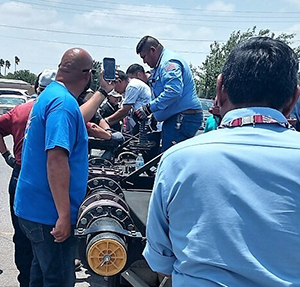Nearly 500 Rio Grande Valley employees receive low-cost infrastructure & safety training

HARLINGEN, TEXAS — Almost 500 Rio Grande Valley employees received low-cost training offered by the Texas A&M Engineering Extension Service (TEEX) during the annual Infrastructure & Safety Summit on April 29 – May 3. Employees from municipalities, counties and construction companies attended the weeklong training event, which was hosted on the campus of the Texas State Technical College (TSTC) in Harlingen.
This is the third year that TEEX’s Infrastructure Training and Safety Institute has collaborated with TSTC’s Workforce Training and Continuing Education Department to offer 22 infrastructure, safety, transportation, code enforcement, and disaster management and recovery training courses to employees in the Rio Grande Valley. This year, 22 courses were offered, with free or deeply discounted registration fees, thanks to General Revenue funding from the state of Texas, with the goal of reaching employees who might not otherwise have access to the training.
Along with water and wastewater continuing education courses, training was offered in heavy equipment and aerial bucket truck operation, hazardous materials transportation, workzone traffic control and flagging, and electrical power transmission. Several OSHA courses were offered, which can be applied toward earning the TEEX Certified Safety & Health Official (CSHO) designation.
A DHS/FEMA-funded course in “Disaster Management for Electric Power Systems” was also offered at no cost through TEEX’s National Emergency Response and Recovery Training Center. New courses offered this year also included Introduction to Disaster Recovery Public Assistance Programs and Disaster Recovery for Senior Officials and a Hurricane Preparedness Tabletop Exercise. Also offered for the first time was “Engaged Leaders — Foundation for the Future.”
“With 400 hours of training and continuing education offered at one location, we hope to contribute to the success of both entry-level and experienced employees in the field of infrastructure and safety by giving them new skills and greater confidence,” said ITSI Division Director Ron Peddy. “Safety is our No. 1 priority, and we believe effective training will not only enhance an employee’s career, but will ultimately improve our communities and make them safer for all of us.”
